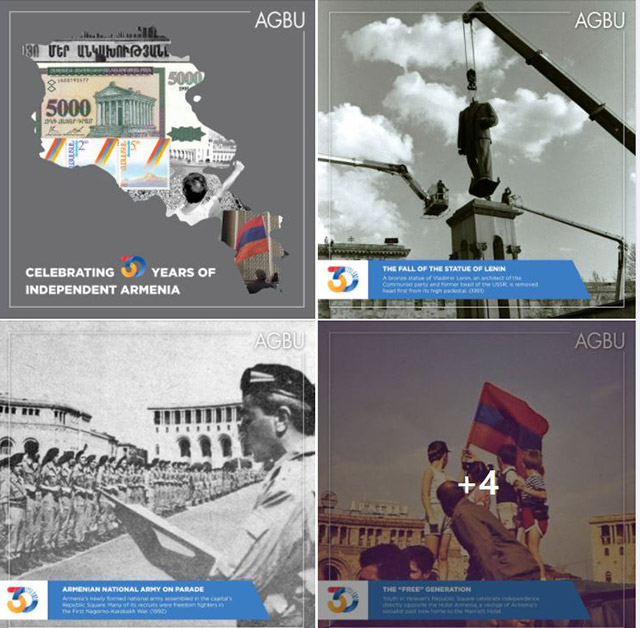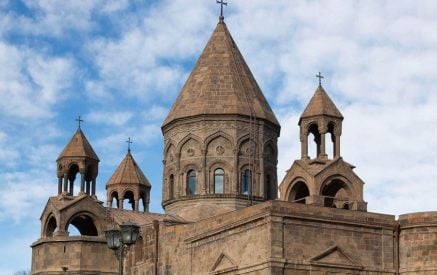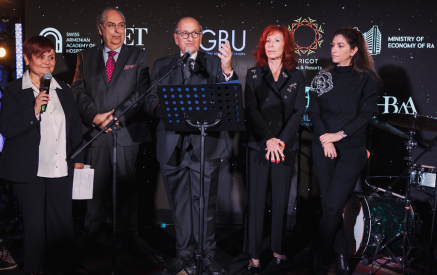This September 21st marks three decades since the Armenian people voted to declare independence as a sovereign nation state, a status not possessed for many centuries since historical Armenia fell under the rule of successive empires except for the short-lived First Armenian Repbulic of 1918-1920, which was ultimately integrated into the USSR.
For those living in those momentous years of the early 1990s, an independent Armenian state was an impossible dream come true overnight, a grand redemption for aging Genocide survivors and their progeny to see in their lifetimes the raising of the tri-color at the United Nations. Back in Yerevan, scenes of Armenian citizens rejoicing as the giant statue of Lenin toppled to the ground and the first Armenian Parliament was sworn into session are also iconic markers embedded in the collective psyche.
Suddenly, the Armenian Identity could be defined not only in the context of past tragedies but in infinite new possibilities to bring the Armenian Nation into the modern world family. A free homeland captured the imagination of Armenians in every corner of the world as the new republic took on the challenges and opportunities of self governance with the active support of the worldwide Diaspora—that saw an independent homeland as the guarantor of its heritage and identity—vigorously engaged in the nation-building process.
Those early days soon turned bittersweet as the realities of independence settled in and Armenia endured many setbacks and false starts because of war and economic challenges. It was not until the mid-90s when the end of the first war over Artsakh ushered in a new era of reconstruction and enterprise.
Read also
In these ensuing years, Armenia had the breathing space to show the world its intrinsic value as a developing country. By the mid- 2000s, the tourism, agriculture and high tech innovation industries had clearly replaced the defunct factory-based economy of the Soviet period. Those dusty Yerevan streets, crumbling buildings, and rickety roads of the early 1990s were transformed into modern thoroughfares and connecting highways, new infrastructure with first world plumbing facilities, safe and clean new schools and concert halls, a futuristic international airport, privately-owned restaurants offering diverse culinary fare, alongside towering international hotels, well stocked supermarkets, and rows of foreign embassies. The regional city of Gyumri, the ground zero of the 1988 Armenian Earthquake, is now a high tech hub for startups, bringing in a renaissance of creative culture appealing to the youth and tourists.
In the provinces, where unemployment has stubbornly persisted to fray the cohesion of intergenerational families and communities, the last decade has seen the rise of women entrepreneurs in rural areas who have been empowered to launch micro enterprises and small businesses. There are afterschool centers for teens to explore creative technologies to stay competitive with their global peers. Many such endeavors are supported by AGBU and its partners working to level the playing field for Armenia’s women and youth.
Higher learning institutions like American University of Armenia (AUA), which AGBU co-founded and has continuously supported, has changed the world view of young Armenians from across the national landscape. And with the help of AGBU and numerous professional healthcare organizations founded by Armenians in the West, the nation’s healthcare system has made steady progress. In the recent pandemic and war, western-trained local physicians and health professionals worked shoulder to shoulder with foreign medical teams to perform back-to-back life-saving surgeries, healing soldiers and civilians with top grade diagnostic equipment and supplies.
Titans of industry and philanthropists from Russia, United States, the Middle East, Europe, and Latin America are the legends that will live on as early Armenian pioneers, visionaries and nation builders, while thousands of youth of Armenian descent visit their homeland to reconnect with their ethnic roots or participate in renovation projects, forming close bonds with their in-country peers. AGBU scholarships have allowed scores of Armenia’s students to dream big and attend the world’s best universities, growing into competitive, sophisticated, and skilled Armenian nationals able to give back to their native country as the times demand.
Since the change of government in 2018, Armenia has held successive elections deemed by international human rights and pro-democracy agencies to have been free and fair. Moreover, the yearnings of the electorate continue to lean into democratic values while maintaining strategically valuable relations with Armenia’s neighbors.
The question that this year’s Independence celebration raises is whether a free Armenian state can prevail with a weakened hand, due to the new geopolitical realities and internal political strife triggered by the Second Artsakh War of 2020.
AGBU, one of the oldest of many Diaspora organizations on the front lines of national crises, takes a long term perspective on the current challenges of the moment. Our focus on putting our people before politics has resulted in countless stories about the resilience of the Armenian people facing life and death situations. These up-close encounters with ordinary citizens and families, from both urban and rural environments, different regions of the world, and many historical turning points, have revealed a common thread of determination and hope that binds us together as one Armenian Nation.
We believe in a free Armenia because that is the essence of the Armenian spirit that lives in every Armenian across the globe. And when Armenians are free to be Armenians, there is no limit to what we can achieve in every sphere of endeavor. Despite all the early setbacks of independence, we somehow stayed the course. So we cannot turn our backs on all that has been accomplished over these 30 years.
Thirty years is still very young in the life of a nation state but Armenia must move past the term “fledgling democracy.” While not yet at its prime, Armenia, before last year’s war, was poised to gain momentum and consolidate progress on many important fronts. We sincerely hope this milestone anniversary will remind Armenians everywhere that after 30 years, we cannot and will not turn back or lose confidence in ourselves.
We are “an against all odds” kind of people and the world must recognize this unique characteristic of ours to repeatedly defy those outworn predictions of our imminent demise. It’s time for the world to bet on Armenia. It is time for us Armenians to bet on ourselves.
In unity is strength.























































